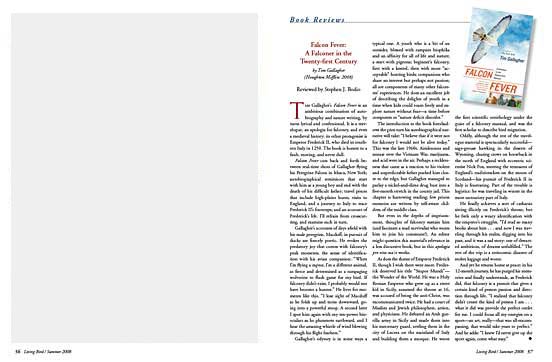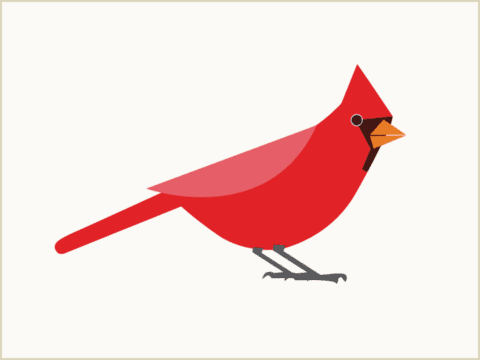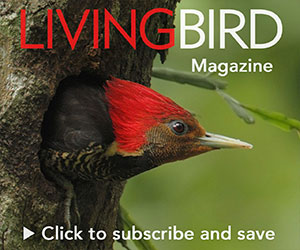Book Review: Falcon Fever, by Tim Gallagher
Reviewed by Stephen J. Bodio
July 15, 2008
Tim Gallagher’s Falcon Fever is an ambitious combination of autobiography and nature writing, by turns lyrical and confessional. It is a travelogue, an apologia for falconry, and even a medieval history: its other protagonist is Emperor Frederick II, who died in southern Italy in 1250. The book is honest to a fault, moving, and never dull.
Falcon Fever cuts back and forth between real-time shots of Gallagher flying his Peregrine Falcon in Ithaca, New York; autobiographical reminisces that start with him as a young boy and end with the death of his difficult father; travel pieces that include high-plains hunts, visits to England, and a journey to Italy to trace Frederick II’s footsteps; and an account of Frederick’s life. I’ll refrain from crosscutting, and examine each in turn.
Gallagher’s accounts of days afield with his male peregrine, Macduff, in pursuit of ducks are fiercely poetic. He evokes the predatory joy that comes with falconry’s peak moments, the sense of identification with his avian companion: “When I’m flying a raptor, I’m a different animal, as fierce and determined as a rampaging wolverine to flush game for my bird. If falconry didn’t exist, I probably would not have become a hunter.” He lives for moments like this. “I lose sight of Macduff as he folds up and turns downward, going into a powerful stoop. A second later I spot him again with my ten-power binoculars as he plummets earthward, and I hear the amazing whistle of wind blowing through his flight feathers.”
Gallagher’s odyssey is in some ways a typical one. A youth who is a bit of an outsider, blessed with rampant biophilia and an affinity for all of life and nature; a start with pigeons; beginner’s falconry, first with a kestrel, then with more “acceptable” hunting birds; companions who share an interest but perhaps not passion; all are components of many other falconers’ experiences. He does an excellent job of describing the delights of youth in a time when kids could roam freely and explore nature without fear—a time before computers or “nature deficit disorder.”
The introduction to the book foreshadows the grim turn his autobiographical narrative will take: “I believe that if it were not for falconry I would not be alive today.” This was the late 1960s. Aimlessness and unease over the Vietnam War, marijuana, and acid were in the air. Perhaps a recklessness that came as a reaction to his violent and unpredictable father pushed him closer to the edge, but Gallagher managed to parlay a nickel-and-dime drug bust into a five-month stretch in the county jail. This chapter is harrowing reading; few prison memoirs are written by self-aware children of the middle class.
But even in the depths of imprisonment, thoughts of falconry sustain him (and fascinate a mad survivalist who wants him to join his commune!). An editor might question this material’s relevance in a less discursive book, but in this apologia pro vita sua it works.
As does the theme of Emperor Frederick II, though I wish there were more. Frederick deserved his title “Stupor Mundi”— the Wonder of the World. He was a Holy Roman Emperor who grew up as a street kid in Sicily, assumed the throne at 16, was accused of being the anti-Christ, was excommunicated twice. He had a court of Muslim and Jewish philosophers, artists, and physicians. He defeated an Arab guerilla army in Sicily and made them into his mercenary guard, settling them in the city of Lucera on the mainland of Italy and building them a mosque. He wrote the first scientific ornithology under the guise of a falconry manual, and was the first scholar to describe bird migration.
Oddly, although the rest of the travelogue material is spectacularly successful— sage-grouse hawking in the deserts of Wyoming, chasing crows on horseback in the north of England with eccentric scientist Nick Fox, meeting the remnants of England’s traditionalists on the moors of Scotland—his pursuit of Frederick II in Italy is frustrating. Part of the trouble is logistics: he was traveling in winter in the most untouristy part of Italy.
He finally achieves a sort of catharsis sitting illicitly on Frederick’s throne, but he feels only a weary identification with the emperor’s struggles. “I’d read so many books about him . . . and now I was traveling through his realm, digging into his past, and it was a sad story: one of thwarted ambitions, of dreams unfulfilled.” The rest of the trip is a seriocomic disaster of stolen luggage and worse.
And yet he returns home at peace: in his 12-month journey, he has purged his memories and finally understands, as Frederick did, that falconry is a pursuit that gives a certain kind of person passion and direction through life. “I realized that falconry didn’t create the kind of person I am . . . what it did was provide the perfect outlet for me. I could focus all my energies on a sport—an art, really—that was all-encompassing, that would take years to perfect.” And he adds: “I knew I’d never give up the sport again, come what may.”

All About Birds
is a free resource
Available for everyone,
funded by donors like you
American Kestrel by Blair Dudeck / Macaulay Library



